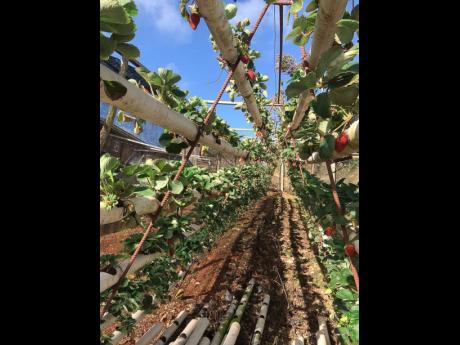Olympian-turned-farmer vows to rebound from COVID-19 hit
The COVID-19 pandemic has hit the Jamaican economy very hard, and two areas – agriculture and tourism – have been among the sectors that have absorbed a lot of body blows.
Several hotels were closed after tourist arrivals from North America hit rock-bottom because of the coronavirus. The United States has seen deaths from the virus rocket past 20,000 after more than 530,000 persons tested positive. Almost 30,000 have recovered. In Canada, there have been over 600 deaths from 23,000 positive tests while 6,300 have recovered.
Locally, Jamaica has registered 69 confirmed positive tests. Thirteen persons have fully recovered while there have been four deaths.
Farmers who supply produce mainly to the tourism sector are now without markets. Olympian Ricardo Chambers, who transitioned from the track to farming back in 2016, is one such farmer who has taken a hit after huge financial losses due to the lack of a market and sales of his crop.
Chambers, who competed for Jamaica at the 2008 Olympics in Beijing, now operates a hydro farm on 15,000 square feet of land in Swaby’s Hope near Spur Tree, Manchester. He told The Sunday Gleaner that he has lost hundreds of thousands of dollars on over 10 beds of high-value crops including parsley, mixed lettuce, and strawberries.
With the hotels being his main market, Chambers says he is unable to sell the over 500lb of crops that he has harvested, and the losses have wiped out his entire investment and have left him on the brink of bankruptcy.
MASSIVE INVESTMENT
“I made a massive investment growing these crops. I had a guaranteed market as I was growing them to be used in the hotels. This was going to be my breakthrough year. I was going to be the go-to guy for parsley, and then the coronavirus came. Hotels closed and wiped out my market. I have to be giving away some of the crops for free,” said a dejected Chambers.
This was not the outcome that the 2010 Intercontinental Cup 400m silver medallist had imagined when he left the sport of track and field to pursue his dream of farming.
After hanging up his spikes in 2016, Chambers turned to farming in a bid to lift himself out of the struggles he was facing financially.
“After I got injured in 2011, I pretty much spent all the money I made out of track and field to try and get myself healthy, and it was just not working out and didn’t make sense for me to continue. In 2016, I decided to come back home and go into farming as I wanted to revolutionise the agricultural sector here in Jamaica.”
According to Chambers, who competed at the 2007 and 2009 World Athletics Championships, an athlete has a small window to make money from the sport. However, with agriculture, it is easier to make money over a longer period, and the risk is lower and the reward greater.
“Farming is definitely the way to go, because you can invest in a crop and make three to four times your money in three months after harvesting and selling. No bank can give you that type of return on your investment,” added Chambers.
Despite losing out on his latest crop and no timetable for when the pandemic will fade, Chambers says he won’t be disheartened by the setback, and he will be using the opportunity to come back stronger.
“This COVID-19 pandemic can bring a lot of opportunities. People are looking to eat healthier, so I decided that I will plant more local crops such as lettuce and sweet pepper that the local markets will consume.”
“I am going to keep working hard and use the hard-working mentality that I have gained from track and field and bring those qualities over to my farming.”


